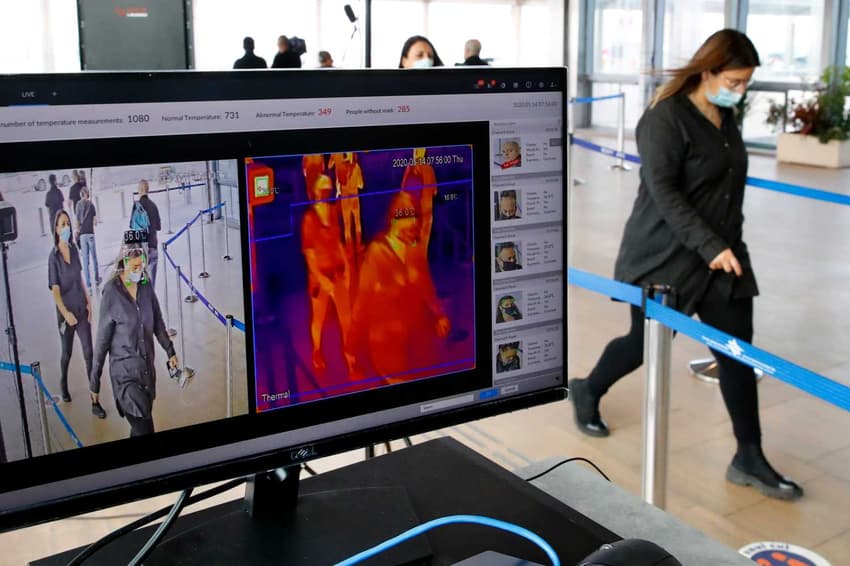How Swiss businesses are using temperature scanners to cut coronavirus risks

Businesses and fitness centres across Switzerland have begun rolling out scanners to determine if their employees have a temperature, mirroring practices that have been common place in China.
While the practice may be able to prevent outbreaks, there are some concerns about civil liberties.
Covid-19 has any number of symptoms - from loss of taste and smell to unknown mental impacts - but one of the most consistent has been high temperatures.
Chinese authorities and businesses have used ‘fever screening’ regularly to identify possible infections, however the systems have mainly been employed in airports when used outside China.
Using infrared technology, the fever scanners hope to identify anyone with an above average body temperature - without needing to come into contact with possibly infectious individuals.
READ: Everything you need to know about Switzerland's new quarantine requirement
FC Luzern already using scanners
Already in use at FC Luzern games, the scanners are growing in popularity across Switzerland.
The Ice Hockey National League told the Neue Zürcher Zeitung that it is considering employing infrared cameras to improve safety at its games.
The scanners have also been put in place at slaughterhouses across Switzerland to detect employee temperatures, as well as at Swiss and international firms including Spectec AG, Unilever and Pilatus-Flugzeugwerke.
The NZZ reports that hotels all across Switzerland have been using the technology, with some hotels advertising to potential guests that their employees are regularly scanned.
Nightclubs have also begun ordering the devices to detect potential infections among patrons - with everyone above 38 degrees to be turned away.
At Pilatus-Flugzeugwerke in Stans, customers and employees are only allowed to enter if they have a body temperature below 37.7 degrees. 2,200 employees are scanned daily.
At Pilatus or Unilever employee who refuses to walk past the camera will not be allowed onto the site and will need to go home.
"The protection or health of all other employees is more important than the interests of an individual employee" a Pilatus spokesperson told the NZZ.
Unilever said that while employees would not be allowed on site without a check, they would continue to receive full pay and would be allowed to work from
Privacy concerns?
Some have expressed concerns about the temperature scanners, saying they are invasive and that the data they collect may fall into the wrong hands.
Most of the software and hardware being used comes from China - where privacy concerns are less stringent.
Representatives from Pilatus-Flugzeugwerke told the NZZ they deleted all relevant information after 14 days.
Isabelle Wildhaber, Professor of Private and Commercial Law at the University of St. Gallen, told the NZZ that while the use of the cameras was likely to be lawful, companies should try and improve overall discretion by protecting the privacy of employees who may be infected.
This could include scanning employees individually or behind a curtain.
Comments
See Also
While the practice may be able to prevent outbreaks, there are some concerns about civil liberties.
Covid-19 has any number of symptoms - from loss of taste and smell to unknown mental impacts - but one of the most consistent has been high temperatures.
Chinese authorities and businesses have used ‘fever screening’ regularly to identify possible infections, however the systems have mainly been employed in airports when used outside China.
Using infrared technology, the fever scanners hope to identify anyone with an above average body temperature - without needing to come into contact with possibly infectious individuals.
READ: Everything you need to know about Switzerland's new quarantine requirement
FC Luzern already using scanners
Already in use at FC Luzern games, the scanners are growing in popularity across Switzerland.
The Ice Hockey National League told the Neue Zürcher Zeitung that it is considering employing infrared cameras to improve safety at its games.
The scanners have also been put in place at slaughterhouses across Switzerland to detect employee temperatures, as well as at Swiss and international firms including Spectec AG, Unilever and Pilatus-Flugzeugwerke.
The NZZ reports that hotels all across Switzerland have been using the technology, with some hotels advertising to potential guests that their employees are regularly scanned.
Nightclubs have also begun ordering the devices to detect potential infections among patrons - with everyone above 38 degrees to be turned away.
At Pilatus-Flugzeugwerke in Stans, customers and employees are only allowed to enter if they have a body temperature below 37.7 degrees. 2,200 employees are scanned daily.
At Pilatus or Unilever employee who refuses to walk past the camera will not be allowed onto the site and will need to go home.
"The protection or health of all other employees is more important than the interests of an individual employee" a Pilatus spokesperson told the NZZ.
Unilever said that while employees would not be allowed on site without a check, they would continue to receive full pay and would be allowed to work from
Privacy concerns?
Some have expressed concerns about the temperature scanners, saying they are invasive and that the data they collect may fall into the wrong hands.
Most of the software and hardware being used comes from China - where privacy concerns are less stringent.
Representatives from Pilatus-Flugzeugwerke told the NZZ they deleted all relevant information after 14 days.
Isabelle Wildhaber, Professor of Private and Commercial Law at the University of St. Gallen, told the NZZ that while the use of the cameras was likely to be lawful, companies should try and improve overall discretion by protecting the privacy of employees who may be infected.
This could include scanning employees individually or behind a curtain.
Join the conversation in our comments section below. Share your own views and experience and if you have a question or suggestion for our journalists then email us at [email protected].
Please keep comments civil, constructive and on topic – and make sure to read our terms of use before getting involved.
Please log in here to leave a comment.